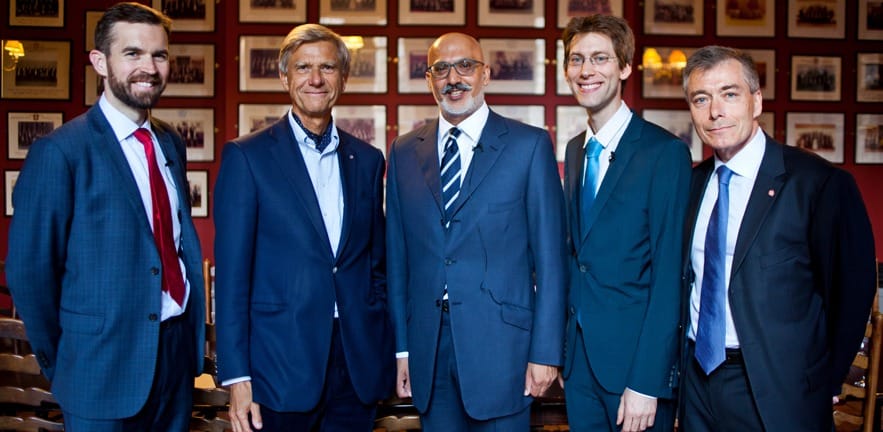Debate on quantum computing, including remarks by Professor Stephen Hawking, inaugurate new Cambridge Judge “Town and Gown” series linking business and academia.
A new “Town and Gown” series of events organised by Cambridge Judge Business School kicked off on 21 April with a debate on quantum computing at the Cambridge Union Society, featuring introductory remarks from University of Cambridge physicist Professor Stephen Hawking, author of A Brief History of Time.
Professor Hawking, who told the audience he was “delighted” to attend the debate, received a warm standing ovation from the prestigious gathering.
Nearly 300 people packed into the Cambridge Union building to hear a debate on the proposition: “This house believes that quantum computing, while scientifically interesting, will not make a practical difference to society in our lifetime.” Quantum computers use “qubits” or quantum bits to perform operations on data in a different way from digital computers.
The event inaugurated the series entitled “Town and Gown: Where Business and Academic Collide,” which will bring together the business and academic worlds together for thought-provoking debate on topics ranging from philosophy to technology. Christoph Loch, director of Cambridge Judge, made opening remarks at the inaugural event.
Speaking in favour of the proposition was Dr Hermann Hauser, co-founder of Amadeus Capital Partners and a serial entrepreneur who has developed or financed many companies in the technology sector, and Jeremy O’Brien, Professor in Physics and Electrical Engineering and Director of the Centre for Quantum Photonics at the University of Bristol.
Speaking in opposition of the proposition were Ilyas Khan, Leader in Residence and Fellow in Management Practice at Cambridge Judge, and Aram Harrow, Assistant Professor of Physics at the Massachusetts Institute of Technology.
“Dreamers are underestimating the problem” of quantum computing making a real practical difference, said Dr Hauser, adding that he was defining “practical” as “something we use every day.” He said there was no proof that quantum computers would be more efficient than classical computers, which already have contributed to huge advances in many areas including face and voice recognition. O’Brien added that professionals in financial services and other fields who might feel threatened by quantum computing could resist it in a very “sophisticated” manner.
“Not only is quantum computing for real, but it will make a difference in our lives,” said Khan. “The number of skeptics (of quantum computing) has fallen, and it’s fallen for a reason.” Harrow added that while few people may actually use quantum computers, a small number of such computers will make a big difference to society by helping to develop new drugs and other important advances. The real issue is not numbers of quantum computers, he said, but “whether they will make a practical difference” to people’s lives.
The proposition was defeated overwhelmingly in the public vote at the close of the debate. This particular audience, at least, believed that quantum computing will make a practical difference in their lifetimes.


